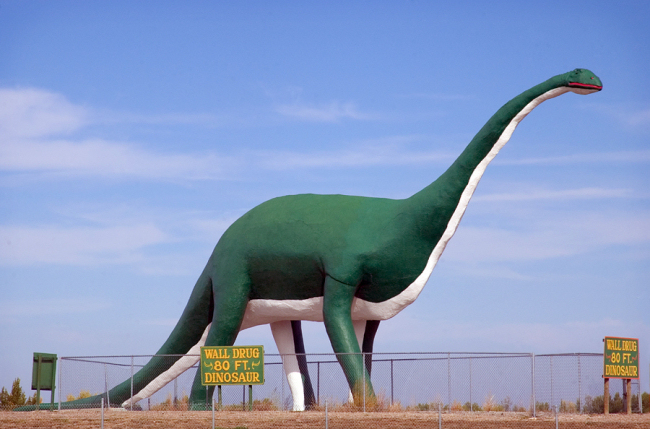
This is the famous Wall Drug Dinosaur in Wall, South Dakota, and it features in "THE DINOSAUR TOURIST", a lovely new Caitlin R. Kiernan story in the Sirenia Digest. It may be the story in the Digest to feature the least amount of weirdness, being a simple tale of a man who picks up a guileless young hitch-hiker who's on his way to meet his internet boyfriend. A subtle chemistry develops between the driver and the hitch-hiker with interesting exchanges based on differences in breadth and kind of experience. It showcases Caitlin's fine ability to create the sensory elements of an experience and has the slow, nice pace of all good road stories, which this one is.
I've been reading a lot lately, maybe because I'm in a Japanese class now I suddenly have a contrary urge to read a lot of English. I'm still re-reading The Lord of the Rings and on Saturday or Sunday I reached chapter 4 from Book Four, or the second book in The Two Towers, "Of Herbs and Stewed Rabbit". And speaking of a slow and easy atmosphere, this is a wonderful chapter which Peter Jackson's film version really doesn't attempt to capture. Most of the basic elements of the chapter are present in the extended version of the film--Gollum fetches some rabbits and Sam decides to cook them, much to Gollum's indignation, who prefers raw meat. Gollum's "What's taters. precious?" line is even reproduced in the film. But there are many differences that completely change the tone and purpose of the scene.

Because Jackson was so focused on creating a film with constant momentum, it's easy to see why he reinterpreted it. But in the book, it's one of the moments that most clearly reminded me that Tolkien was a World War I veteran. After the Dead Marshes and grey, featureless lands of Mordor, the Hobbits and Gollum come to a place that's strangely beautiful.
So they passed into the northern marches of that land that Men once called Ithilien, a fair country of climbing woods and swift-falling streams.
It's easy to imagine soldiers, accustomed to the hellish landscape surrounding trenches, suddenly coming across areas not yet spoiled by the war.
Many great trees grew there, planted long ago, falling into untended age amid a riot of careless descendants; and groves and thickets there were of tanmarisk and pungent terebinth, of olive and of bay; and there were junipers and myrtles; and thymes that grew in bushes, or with their woody creeping stems mantled in deep tapestries the hidden stones; sages of many kinds putting forth blue flowers, or red, or pale green . . .
It's after Frodo has fallen asleep that Sam slowly starts to remember the cookware and formulates his plan to make a decent meal for his master. The wonderful thing about the scene, and the reason Sam quickly takes over the narrative, is that we see him, much more than simply cooking a meal, single-handedly creating a familiar domestic atmosphere, motived both for himself and for the love he feels for Frodo watching him sleep.
Frodo's face was peaceful, the marks of fear and care had left it; but it looked old, old and beautiful, as if the chiselling of the sharping years was now revealed in many fine lines that had before been hidden, though the identity of the face had not changed. Not that Sam Gamgee put it that way to himself. He shook his head, as if finding words useless, and murmured: 'I love him. He's like that, and sometimes it shines through, somehow. But I love him, whether or no.'
After all the time Tolkien spends describing their slow, grim, and hopeless journey, it's wonderful that Sam instinctively wants to spend a lot of time and energy cooking and in the process he even turns Gollum into a familiar domestic figure, the lazy and surly servant lad.
'Smeagol'll get into real true hot water, when this water boils, if he don't do as he's asked,' growled Sam. 'Sam'll put his head in it, yes precious. And I'd make him look for turnips and carrots, and taters too, if it was the time o' the year. I'll bet there's all sorts of good things running wild in this country. I'd give a lot for half a dozen taters.'
The beauty in this scene is an interesting contrast to the impatience Frodo expresses regarding Hobbit culture at the beginning. It's easy to think again of men itching for glorious and worthy battle and then finding something horribly different in the first World War and suddenly foolish homebodies don't seem so foolish after all.

No comments:
Post a Comment